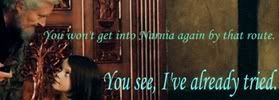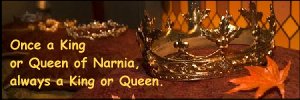This is a question that has somewhat puzzled me ever since I first read VODT (which was before the movie came out,) and it came up again this last time I watched the movie. Please understand that in my opinion the book far outshines the movie in many respects, so while I usually do book/movie comparison, I always try to examine each movie as an individual entity, and this time several interesting questions arose, "What is the meaning of the 7 swords?" It's not that I wanted a detailed explanation in the movie but at least when the stone table cracked and caused the curse to end, you knew it was because of Aslan's sacrifice and also that the "prophecies" and "deeper magic" had foretold it, both in the movie and book... but with the seven swords, inserted by the film makers, they either deliberately or absentmindedly left out any such context. Other than perhaps that the swords were from the golden age and that Caspian the 9th had them and obviously thought they were powerful, but that's not really my real question, I can believe that the "meaning" was about defeating fear, and that the the seven swords have mythical properties (even Lucy and Edmund have forgotten) that when put together destroyed the "dark island." This just lead me to my real question "Why did the three sleepers wake up?" and then "Well why did they wake up in the book?" Rereading the section from the book the answer simply is that Reepicheep left Narnia for Aslan's Country... Is there a spiritual analog that I'm missing here, something deep that CS Lewis has concealed?
The only thing I can think of is sacrifice, someone giving up their own life in narnia for the sleepers, but no one dies, and reepicheep has wanted to go there his whole life so no one really sacrifices anything.
In the movie it is stated simply that the three sleepers would wake up when "everything is put right" which sort of makes sense if, similar to the dufflepuds, the sleepers were put to sleep to keep them safe from the temptations of the green mist that was driving them mad.
But what about the book? Why do the sleepers wake up when Reep leaves?
To break the encahntment you must sail to the World's End, or as near as you can come to it, and you must come back having left at least one of your company behind. [Who] must go on into the utter east and never return into the world. -Ramandu
I've argued in the past about this being an echo of Aslan's sacrifice. But upon reflection I agree that it wasn't a sacrifice for Reepicheep since his reaction to Ramandu's statement is,
That is my heart's desire.
What I've taken away lately is our own journey to get closer to God is both good for us (like it was for Reepicheep) but also can maybe wake up a sleeping world (saturated by distractions) to better know God for themselves. The lords are seated not in a dungeon but are seated at a feast on Aslan's table. They could be seen as a sleeping church missing out on the feast (goodness of God). While Reepicheep's journey to the world's end could represent a genuine relationship with God, and those kind of relationships tend to shake things up in church a little bit. There could be other meanings also. This is just one that I've been thinking about lately.
I like that it is a win/win scenario. It at least reminds the reader that Aslan's sacrifice did something meaningful. This enchantment is a pleasure for Reepicheep to break rather than something difficult.
"Reason is the natural order of truth; but imagination is the organ of meaning." -C.S. Lewis
Thank you for those thoughts! And yes that does make sense, I can't think of any specific verses but in the new testament we are called time and time to "count it all joy," and to give generously and abundantly
But what about the book? Why do the sleepers wake up when Reep leaves?
One thing interesting me just recently about the books was Caspian's desire to find the seven lords who had been banished by Miraz. There were only seven lords, it definitely was not Caspian's fault they were banished, and it would take risking of more lives (and the death of one) to find the lords. Deciding to stay at the end of the world shows even more that they are committed to rescuing the lords.

Narnia Comics: viewtopic.php?f=11&t=5560
Personally, I don't see a deeper meaning in the way they were awakened. It is clear that they were put to sleep as a punishment. They were freed when the appointed tasks were done. It is common in fairy tales for enchantments to be broken by some sort of task. It this case if was sailing to the end of the world and leaving someone behind. Often the tasks fulfill the desire of the doer in someway. The princes in the stories in our world want to kiss the princesses for example. There doesn't have to be a deeper meaning to everything in the books.

NW sister to Movie Aristotle & daughter of the King
I think that it was meant as symbolism of sacrifice, although I admit it does seem sort of convenient for the crew. To do so would mean to give up one's life in Narnia, although for Reepicheep it meant that he trusted in Aslan and Aslan meant more to him than anything. Reepicheep demonstrates this longing and trust in Aslan throughout the book and it finally comes to play in the end.
In fantasy, the author does not need to explain as much as in other stories. Things happen just because that is how it works in the world. Why are certain ingredients necessary to make a potion, or why do certain words create spells? It is unknown but does not need to turn into a plot hole as long as the audience can accept it.
In the movie, I felt that something was lost when they woke up the sleepers by using the swords. In the book, I felt that going to the end of the world was a great sacrifice and honor. But in the movie, there was no real sacrifice or honor in the way they saved the sleeping lords. Eustace fought off some green mist and then put the swords in their place to wake the sleepers. No sacrifice or honor was needed to do this.
Personally, I don't see a deeper meaning in the way they were awakened. It is clear that they were put to sleep as a punishment. They were freed when the appointed tasks were done. It is common in fairy tales for enchantments to be broken by some sort of task. [...] There doesn't have to be a deeper meaning to everything in the books.
Admittedly, this is how I've always thought of that part--we have the classic fairy tale ending, as a happy ending, when Reepicheep fulfills the task. However, there is another question you could ask about it. This was a punishment; so, why was someone else able to wake them up? They're the ones who fought at Aslan's table and tried to use the knife; why does Reepicheep's sacrifice let them awaken? I think everyone has made good points, about how Caspian's heart's desire (which was a noble goal) would be negated without it, etc., but I think there's also a message of redemption to be found here. The lords were released from their sleep because they were forgiven, even though they did nothing on their own to earn it.
And Eustace, I have to agree with you--that's one of the flaws of the movie, that this message is lost. It's less a question of "What are these characters willing to do to set things right?", and becomes "We must finish this quest to save the world!" (And I'll stop there, because I could go for quite some time about this subject.  )
)
N-Web sis of stardf, _Rillian_, & jerenda
Proud to be Sirya the Madcap Siren
I'm going to look not so much at the internal logic of the story, as of the external reasons for the author.
Lewis wrote the Chronicles as fairy-tales. In this story he deliberately turns the convention of the fairy-tale upside down, as Ramandu's daughter states that here it is the opposite of the fairy-tale, where the prince cannot lift the enchantment until he has kissed the princess - instead, he cannot kiss the princess until he has lifted the enchantment.
Lifting the fairy-tale's enchantment was to wake somebody up - not just the princess, but everybody at the castle had been asleep and were woken up when the kiss broke the enchantment.
Lewis isn't having the princess lost in an enchanted sleep, but he still wants an enchanted sleep, and gives it to the last three Lords instead.
He then gives a reason for it, saying that it is given as punishment for trying to fight each other with a sacred weapon - but I think that the fairy-tale element came first, and that the reasoning behind it, including any message in how the enchantment was to be lifted, is secondary.

(avi artwork by Henning Janssen)


